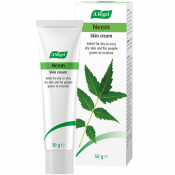Can travelling make your skin breakout?
There are plenty of reasons why travelling can cause problems for your skin; stress, flying and a new climate are just a few to start off with. That’s why, today, I thought I’d address some of the main issues that might play havoc with your skin if you’re travelling and how you can overcome these to maintain healthy, glowing skin! Let’s take a look at the first problem, shall we?
1. Stress

Sometimes it isn’t the holiday itself that’s responsible for our troubled skin, but rather the stressful build-up. When it comes to travelling, usually there’s so much to take care of in advance, from packing, to sorting out boarding passes, to worrying about potentially cancelled flights or delayed trains.
It’s understandable that, with so much to organise, your stress levels will be fluctuating a bit. And that’s to say nothing of travel anxieties such as flying! Unfortunately, as I’ve discussed many times here at A.Vogel Talks Skin, stress and anxiety can be disastrous for your skin, robbing it of crucial nutrients and making it more vulnerable to inflammation. That’s why it’s important to address this problem right from the get-go!
How can you beat travel stress?
When it comes to beating travel stress, our Mood Advisor, Marianna, has got you covered with her blog, ‘Avoid travel stress – 7 healthy habits of happy holidaymakers’ wherein she discusses the importance of being organised and recommends a few remedies to help you deal with anxious emotions. Emergency Essence is one that I would definitely opt for, especially if you are a nervous flyer!
2. Flying

One common question that I often get asked is, ‘Why does my skin breakout when I fly?’. The truth is, there are a multitude of answers – flying, in general, is tough on our skin. You sit for hours in a pressurised cabin exposing your skin to recycled air and a whole host of bacteria. This can not only reduce the blood flow to your skin, but it can also dry your skin out and make it more susceptible to inflammation.
What can you do about travelling on an airplane?
Air travel is easily the quickest way of getting to and from far-off places, so it’s pretty much unavoidable if you’re going to be travelling any real distance. My advice would be to try and make sure you take a bottle of water on to the plane with you – it’s really easy to become dehydrated during a long flight – and to try and avoid any alcoholic drinks. These might get you into the holiday mood, but they will only bloat your skin and cause unwanted puffiness in the long-run.
It’s also really important you don’t remain sedentary for too long so, at least once an hour, try to get up and have a walk around the plane. This should help your circulatory system, allowing more nutrients and oxygen-rich blood to make it to your skin. It also wouldn’t hurt to carry some travel-sized hand sanitizer on you as, throughout the flight, you’ll touch your face without really thinking about it, transferring all the bacteria and germs on your hands directly to your skin.
3. Hotels

This might sound like a bit of an odd reason for your skin to be breaking out, but bear with me. When you go on holiday, not only will your skin be more sensitive after travelling to your destination, but you’ll then also be exposing it to new skincare products in the form of the toiletries typically found at some hotels. The problem is that many of these products contain harsh, chemical ingredients, which you’re then applying to your skin when it’s less equipped to deal with them.
This can then inspire plenty of breakouts and flare-ups, but another issue that hotels have is that, like airplanes, they can lack humidity. If you go to hotter countries then the chances are you’ll have the air conditioning cranked up which, over time, can strip essential oils and moisture from your skin, making it drier and more prone to irritation.
What can you do to combat these issues?
If you’re on holiday somewhere tropical, there’s no getting around the fact that you’re going to rely on the air conditioning to make your living quarters more bearable. This is completely understandable, which is why I’d recommend including a good, high-quality moisturiser in your holiday skincare routine – don’t rely on hotel toiletries! Our Neem Cream is a nice option here as it’s extremely soothing and has natural anti-inflammatory properties to help take away the irritation from dry, vulnerable skin.
My Top Tip: This soothing Neem Cream is ideal for itchy or irritated skin, helping to relieve signs of dryness and alleviate flare-ups. This soothing Neem Cream is ideal for itchy or irritated skin, helping to relieve signs of dryness and alleviate flare-ups.
|
4. Adjusting to a new climate

No matter whether you’re travelling somewhere tropical or somewhere arctic, your skin is going to take time to adjust to the new climate. It doesn’t help that, during this time, any existing skincare routine either goes out the window completely, or is no longer suited to supporting your skin in this new environment.
The biggest issue that is likely to affect your skin on your travels (aside from sun exposure!) is humidity. If there isn’t enough humidity (as is often found in colder climates or dry, hot climates), then your skin is going to become dry and sensitive very, very quickly. On the opposite end of the spectrum, if there’s too much humidity (think tropical countries on the cusp of the rainy season) then this too can damage your skin, making you more prone to oily skin and more susceptible to fungal skin infections.
How can you help your skin adjust to the new climate?
So, how you help your skin to adjust is really going to depend on where the environment falls on this spectrum. In the case of low humidity, you’re going to want to be moisturising your skin as much as possible, perhaps exfoliating as well once or twice a week. In climates that exhibit high humidity, dehydration and excessive sweating is going to be the real worry here. Drink plenty of fluids and make sure that you’re regularly cleansing your skin with a gentle, natural cleanser.
It should also go without saying that, wherever you go, sun protection should be top of mind. The full effects of sunburn go far beyond simply causing temporary damage – as I discuss in my blog, ‘How much does the sun really age your skin?’, UV radiation is the biggest cause of premature ageing! Try to avoid exposing your skin too much between 10am and 2pm, and make sure you’re regularly reapplying a gentle, natural suncream.
5. Overindulging in food and drink

It’s not exactly a secret that, when we go on holiday, we tend to overindulge when it comes to food and drink. With so many new meal options on offer and the chance to sip a cocktail in the sun, it’s hardly surprising - but all this excess can upset your skin.
Alcohol and sugary foods are especially to blame here, as these can stress your liver and your gut, leading to problems like inflammation and flare-ups. It also doesn’t help that our eating habits can sometimes lead to bouts of tummy problems such as diarrhoea and bloating too!
How can you use your diet to support your skin?
When it comes to your diet when you’re on holiday, a little bit of excessiveness is to be expected, but try to keep some sense of moderation in mind. When I go travelling, I always try to take advantage of the local produce wherever I am going – the fresh fruits, veg and fish that I wouldn’t normally get to try back home. I also try to plan ahead, just in case I do come down with a case of ‘traveller’s tummy’ and normally pack some Tormentil just to be on the safe side!
6. Insect bites and allergies

Depending on where you’re travelling, insect bites and allergies could be a potential problem for your skin. Certain allergies, like hayfever, aren’t unique to the UK so these could still affect you if you do journey abroad; in some countries, insects like mosquitoes and midges can be a real pest to watch out for. In mild cases, the bites of these bugs can easily upset your skin but, in more serious instances, they can actual transmit disease!
How can you overcome insect bites and allergies?
As the old adage goes, prevention is better than cure; with this in mind, try to prepare in advance for any allergies in advance. Hayfever, for example, is one common summer allergy that can affect your skin, so make sure you pack some Pollinosan with you on your travels. It also couldn’t hurt to prepare yourself for the possibility of prickly heat – our Stinging Nettle Complex is a good addition here as this has natural antihistamine properties that can help to ease your symptoms.
Finally, do your research on where you’re going. What are pollen levels like in that area? What are the native species of insect? How common are they? Once you have a good idea of what you’re up against, it’s easier to adjust and plan your skincare regime accordingly. We do offer a Neem Insect Repellent Spray, so this could be a useful travel companion if you are heading somewhere with a vibrant insect population.









